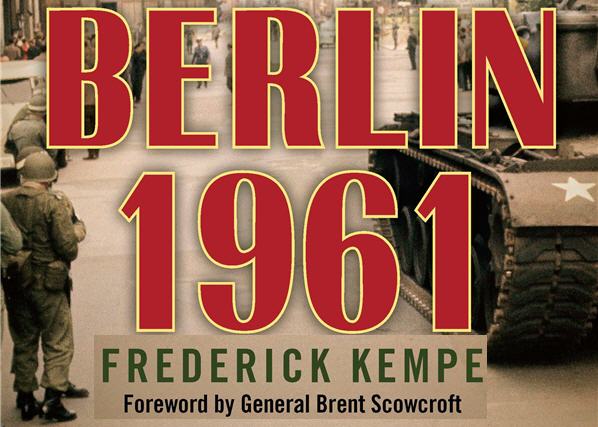
It was just minutes before midnight, and Nikita Khrushchev had reason to be relieved 1960 was nearly over. He had even greater cause for concern about the year ahead as he surveyed his two thousand New Year’s guests under the towering, vaulted ceiling of St. George’s Hall at the Kremlin.
As the storm outside deposited a thick layer of snow on Red Square and the mausoleum containing his embalmed predecessors, Lenin and Stalin, Khrushchev recognized that Soviet standing in the world, his place in history, and – more to the point – his political survival could depend on how he managed his own blizzard of challenges.”
So begins Chapter One of my new book — Berlin 1961: Kennedy, Khrushchev and the Most Dangerous Place on Earth — which will be released tomorrow. New Year’s Eve is a good place to start any story about a year in history, but the real reason to start there was to introduce readers immediately to Khrushchev’s psyche, shaped perhaps more by internal enemies than any external threat.
Kennedy would not be the first or the last U.S. president who failed to understand that domestic power struggles could be decisive in authoritarian behavior, and President Barack Obama should take note. All politics is local, even for dictators.
Whether Libyan leader Muammar Gaddafi survives will depend greatly on the loyalty of those around him. If President Obama wants to prevent Iran from acquiring nuclear weapons or from further disrupting the Mideast, he must first come to terms with the complex domestic politics that keeps Ayatollah Ali Khamenei as supreme leader and Mahmoud Ahmedinijad as president.
It follows that a half century ago, as Khrushchev prepared to deliver his much-anticipated New Year’s eve toast, what he said would depend as much on domestic calculations as on his assessment of the newly elected and not-yet inaugurated President Kennedy.
And he had begun the year on defense.
At home, Khrushchev was suffering his second straight failed harvest. He was failing miserably in his campaign to overtake U.S. living standards by 1970, not even meeting his people’s basic needs. His advisers were telling him the chances of a workers’ revolt, not unlike the one he had crushed in Hungary in 1956, were growing.
Abroad, Khrushchev’s foreign policy of peaceful coexistence with the West, a controversial break with Stalin’s notion of inevitable confrontation, had crash-landed when a Soviet rocket brought down an American U-2 spy plane the previous May.
Though it was only January, Khrushchev’s worried about the 22nd Communist Party Congress in October, where he knew his enemies would come bearing sharpened knives. Having used just such gatherings to purge his own adversaries, all his plans for the year ahead would be designed to head off catastrophe there.
With that as backdrop, nothing threatened Khrushchev more than the deteriorating situation in Berlin, through which East Germany was losing as refugees its most capable industrialists, intellectuals, farmers, doctors and teachers. Khrushchev was found of calling Berlin the testicles of the West, a tender place where he could squeeze when he wanted to make the U.S. wince. However, it was more accurate to say that it had become his Achilles’ hell, the place where communism lay most vulnerable.
After the clock struck midnight, Khrushchev said that the American people, by voting for Kennedy against then-Vice President Richard Nixon, had cast their vote against their country’s confrontational Cold War policies. “We hope the new U.S. president will be like a fresh wind blowing away the stale air between the USA and the USSR,” he said.
What he didn’t say was that through a number of intermediaries he was already urgently seeking an early summit meeting with Kennedy on Berlin on other matters. If that didn’t succeed, internal pressures would push him toward confrontation.
Khrushchev was a Communist in a hurry.
Fred Kempe is president and CEO of the Atlantic Council. His latest book, Berlin 1961, will be available May 10. This blog series originally published by Reuters.
Image: berlin1961-cropped.jpg
